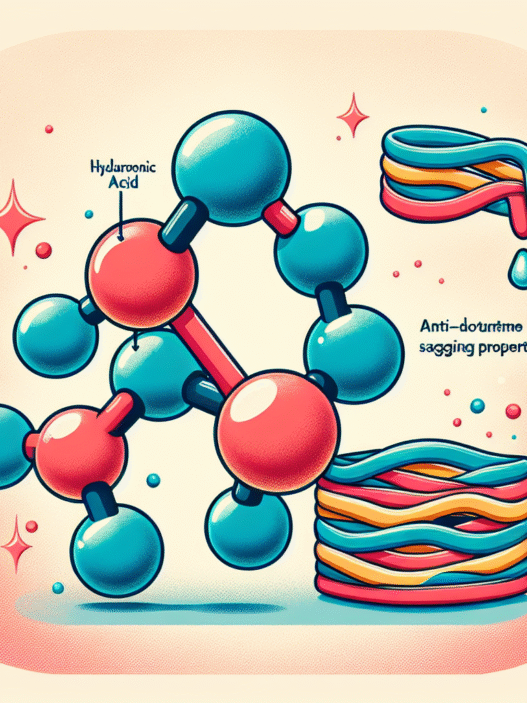Understanding Hyaluronic Acid
Hyaluronic acid is a vital component in the realm of skincare and overall health, known for its impressive ability to retain moisture.
Natural Hydration Key
Hyaluronic acid is naturally occurring in the body, especially concentrated in the skin, eyes, and joints. This powerful humectant plays a critical role in maintaining hydration, allowing these areas to retain moisture effectively. It can bind up to 1000 times its weight in water, functioning as a molecular sponge that captures and retains moisture. As individuals age, the body’s natural production of hyaluronic acid decreases by approximately 6% per decade, leading to reduced skin volume and the formation of wrinkles. By the age of 50, the hyaluronic acid supply in the body may be halved, resulting in less plump and hydrated skin (Typology).
Skin, Eyes, and Joints Support
The majority of hyaluronic acid is found in the skin, where it significantly enhances skin plumpness and volume. Beyond skincare, hyaluronic acid provides essential support to the eyes and joints. It contributes to maintaining moisture in the eyes, ensuring comfort and preventing dryness. In the joints, hyaluronic acid acts as a lubricant, facilitating smooth movement and flexibility. This makes it not only a key player in skincare but also an essential element for overall health and mobility.
| Component | Function |
|---|---|
| Skin | Enhances hydration, volume, and plumpness |
| Eyes | Maintains moisture; prevents dryness |
| Joints | Acts as a lubricant; enhances flexibility |
Considering the diverse roles of hyaluronic acid, incorporating it into a skincare routine can yield numerous benefits. To explore the advantages of hyaluronic acid further, check out our article on hyaluronic acid benefits. Whether through serums, moisturizers, or supplements, hyaluronic acid stands out as a remarkable ingredient in the fight against aging and dryness. For detailed product options, visit our sections on hyaluronic acid serum and hyaluronic acid moisturizer.
Benefits of Hyaluronic Acid
Hyaluronic acid serves as a powerful ally in the world of skincare. Its impressive properties contribute significantly to skin health and overall appearance, making it a favored ingredient among beauty enthusiasts.
Skin Health Booster
Hyaluronic acid is a natural substance that exists in the body, particularly in the skin, eyes, and joints. Known for its ability to retain moisture, it can hold up to one and a half gallons of water per quarter-teaspoon, making it an exceptional humectant. This quality enables hyaluronic acid to hydrate the skin effectively, leading to a plumper and more youthful appearance.
Long-term use of hyaluronic acid serums can significantly enhance overall skin health. Regular application promotes a more vibrant complexion, reducing the visibility of fine lines and wrinkles. For those seeking additional benefits, hyaluronic acid can be combined with other ingredients, such as ceramides, to create powerful skincare products that address dryness and dehydration effectively. Visit our section on hyaluronic acid benefits for more details.
Flexibility and Elasticity
Hyaluronic acid also plays a critical role in improving the flexibility and elasticity of the skin. As individuals age, the natural levels of hyaluronic acid in the skin decrease, leading to a loss of firmness and suppleness. Incorporating hyaluronic acid into a skincare regimen aids in replenishing this essential component, contributing to skin elasticity.
The long-term effects of using hyaluronic acid, whether obtained through topical application or oral supplements, help to promote skin regeneration and maintain a youthful look. Its ability to enhance skin elasticity can prevent sagging, leading to an overall firmer complexion. Additionally, hyaluronic acid complements retinol, a common anti-aging ingredient, by soothing the skin and mitigating potential side effects such as dryness and irritation (Software).
The table below summarizes the key benefits of hyaluronic acid in skincare:
| Benefit | Description |
|---|---|
| Hydration | Retains moisture effectively for a plump appearance |
| Skin Health | Enhances overall skin vitality and reduces fine lines and wrinkles |
| Elasticity and Flexibility | Improves skin’s suppleness and firmness |
| Complementary to Retinol | Soothes irritation without compromising effectiveness |
Hyaluronic acid is a versatile ingredient that not only supports skin health but also enhances the effectiveness of other skincare components. For those looking to explore products, consider options like a hyaluronic acid moisturizer or hyaluronic acid cream for optimal benefits.
Hyaluronic Acid in Skincare
Topical Application Safety
Hyaluronic acid is broadly recognized as safe for topical application in various skincare products. It is a common ingredient found in over-the-counter serums, creams, lotions, and eye care products. According to the Cleveland Clinic, these products are generally safe for use and have minimal side effects, making them a popular choice among beauty enthusiasts.
Prescription formulations of hyaluronic acid, such as injections, should be used strictly as instructed by healthcare professionals. Injections of hyaluronic acid must only be administered by licensed personnel to ensure safety and efficacy.
For pregnant or nursing individuals, hyaluronic acid is typically deemed safe, with adverse reactions being extremely rare (ALASTIN Skincare). However, it is advisable to consult a doctor before introducing any new products into a skincare regimen during these times.
Oral Supplements Consideration
In addition to topical applications, hyaluronic acid is available in oral supplements, which are also considered safe for consumption. Like topical products, it is recommended to discuss the usage of oral supplements with a healthcare provider before incorporating them into a routine, especially for individuals with pre-existing health conditions.
The safety profile of hyaluronic acid contributes to its widespread use in skincare and beauty products, underscoring its benefits not only for moisturizing and hydrating the skin but also for overall skin health. For more insights on how hyaluronic acid can enhance the skin’s appearance, explore our articles on hyaluronic acid benefits, and hyaluronic acid serum.
Here is a table summarizing the safety considerations of topical vs. oral hyaluronic acid:
| Application Type | Safety Considerations |
|---|---|
| Topical | Generally safe; minimal side effects; consult healthcare provider if pregnant or nursing. |
| Oral | Safe; discuss with healthcare provider before use. |
The inclusion of hyaluronic acid in a skincare routine can greatly contribute to hydration and overall skin health, making it a favored ingredient in the beauty community. For further details on specific products, visit our pages on hyaluronic acid moisturizer and hyaluronic acid cream.
Synergies with Other Ingredients
Enhancing Retinol
Hyaluronic acid is an excellent companion for retinol, a popular ingredient known for its anti-aging benefits. While retinol can be effective in promoting cell turnover and reducing wrinkles, it often causes side effects like excessive dryness, flaking, redness, and irritation. Hyaluronic acid complements retinol by soothing the skin and does not interfere with the efficacy of this vitamin A derivative. This makes it a perfect match for retinol products, enabling users to enjoy the benefits of both without compromising skin comfort (Software).
| Ingredient | Benefit |
|---|---|
| Hyaluronic Acid | Hydrates and soothes skin |
| Retinol | Promotes cell turnover, reduces wrinkles |
Dynamic Duos in Skincare
Combining hyaluronic acid with other beneficial ingredients can elevate skincare routines. Below are several dynamic duos that work effectively together:
| Ingredients Pairing | Benefits |
|---|---|
| Acetyl Hexapeptide-8 and Hyaluronic Acid | This combination helps hyaluronic acid penetrate deeper layers of the skin for enhanced moisture retention, resulting in significantly better skincare results (Software). |
| Glycolic Acid and Hyaluronic Acid | Ideal for dry skin types, as both ingredients are powerful hydrators. Hyaluronic acid also helps mitigate potential side effects of glycolic acid, such as irritation and redness (Software). |
| Ceramides and Hyaluronic Acid | A highly moisturizing pair that addresses dryness. Ceramides create a protective barrier, while hyaluronic acid attracts and retains moisture (Software). |
| Vitamin C and Hyaluronic Acid | Together, they reveal smoother, brighter skin with an even tone. Hyaluronic acid aids in hydration and enhances the effectiveness of Vitamin C’s antioxidant properties, helping to mitigate free radical damage from sun exposure. |
These combinations demonstrate the versatility of hyaluronic acid in enhancing the effectiveness of various skincare products, making it a fundamental ingredient for anyone seeking hydrated and youthful skin. For those interested in specific formulations, consider exploring our section on hyaluronic acid serum or hyaluronic acid moisturizer.
Types and Molecular Weights
Understanding the different types of hyaluronic acid and their molecular weights is essential for taking full advantage of its benefits in skincare. Each form offers unique advantages based on their structure and weight, influencing their effectiveness and application.
Diverse Hyaluronic Acid Forms
There are several forms of hyaluronic acid used in skincare products, each varying in molecular weight and function. Below is a summary of the different types of hyaluronic acid:
| Type of Hyaluronic Acid | Characteristics & Benefits |
|---|---|
| High Molecular Weight HA | Forms a film on the skin’s surface, providing immediate hydration and moisture retention. |
| Middle Molecular Weight HA | Balances between superficial hydration and deeper penetration, offering both immediate and long-term benefits. |
| Low Molecular Weight HA | Penetrates deeper into the epidermis, providing long-lasting hydration and anti-aging benefits. |
| Cross-Linked HA | Offers enhanced stability and support for skin structure, often used in injectables. |
| Acetylated HA | Absorbs three times more water than standard HA and reduces wrinkles while preventing collagen degradation. |
These variations allow for tailored skincare formulations that can address diverse concerns, from surface hydration to deeper anti-aging effects (Typology).
Molecular Weight Effects
The molecular weight of hyaluronic acid plays a crucial role in its penetration ability and overall effectiveness in skincare. Smaller molecules, particularly those under 500 kDa, are more effective at penetrating the skin compared to larger molecules above this threshold. Here’s a summary of how different molecular weights affect the performance of hyaluronic acid:
| Molecular Weight (kDa) | Penetration Ability | Benefits |
|---|---|---|
| < 500 | Easily penetrates skin | Deep hydration, regenerative benefits, anti-aging properties. |
| > 500 | Limited penetration | Primarily hydrates surface layers, forms a protective barrier. |
High molecular weight hyaluronic acid effectively forms a barrier on the skin, providing surface-level hydration and moisture retention, which is essential for maintaining a healthy skin barrier. In contrast, low molecular weight options are ideal for those seeking deeper hydration and skin regeneration.
Utilizing the right form and molecular weight of hyaluronic acid in skincare routines can optimize hydration and enhance overall skin health. To experience the benefits fully, consider using products like hyaluronic acid serum or hyaluronic acid moisturizer tailored to your skin’s needs.
Maximizing Hydration Benefits
To fully take advantage of the benefits of hyaluronic acid in skincare, there are essential tips and strategies to consider. This section discusses skincare formulation techniques and how to tailor a skincare routine to enhance hydration.
Skincare Formulation Tips
Choosing the right formulation can enhance the effectiveness of hyaluronic acid. Several forms of hyaluronic acid exist, each with unique benefits:
| Form of Hyaluronic Acid | Benefits |
|---|---|
| High Molecular Weight | Moisturizes surface layers of the skin |
| Hydrolyzed | Prevents water evaporation in connective tissue |
| Low Molecular Weight | Penetrates deeper for anti-aging effects |
| Cross-Linked | Provides stability for long-lasting hydration |
| Acetylated | Absorbs three times more water, reduces wrinkles |
When applying hyaluronic acid in formulations, it’s recommended to keep the concentration below 2 percent to avoid potential skin reactions. This ensures that hyaluronic acid can effectively hydrate the skin without causing irritation or unwanted ingredient interactions.
Specific products can contain various forms of hyaluronic acid. For instance, a moisturizing toner may include low molecular weight hyaluronic acid for deep hydration, while a moisturizing serum may combine hyaluronic acid with provitamin B5 to enhance skin plumpness and elasticity. Additionally, face creams enriched with hydrating active ingredients restore skin suppleness.
Tailoring Skincare Routine
To maximize the hydration benefits of hyaluronic acid, individuals can tailor their skincare routine. It is beneficial to choose products based on skin type and specific needs:
-
Identify Skin Type: Understanding whether skin is dry, oily, combination, or sensitive will help in selecting appropriate products.
-
Layering Products: Use hyaluronic acid serum under a moisturizer to lock in hydration. It is effective when applied to damp skin to maximize moisture retention.
-
Combine with Other Ingredients: Pairing hyaluronic acid with nourishing oils, such as coconut oil, can provide enhanced hydration and nourishment for various skin types (Typology).
-
Incorporate Regular Exfoliation: Gentle exfoliation helps remove dead skin cells, allowing for better absorption of hyaluronic acid and other active ingredients.
-
Stay Consistent: Regular use of hyaluronic acid products can lead to improved skin hydration, elasticity, and overall appearance.
By implementing these formulation tips and tailoring the skincare routine to individual needs, skincare enthusiasts can effectively maximize the hydrating properties of hyaluronic acid. For more on how this powerful ingredient supports skincare health, check out our page on hyaluronic acid benefits.





















